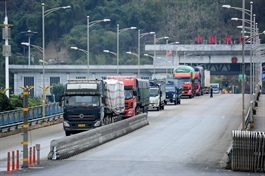Majority of FDI businesses in Vietnam report 2019 losses
Majority of FDI businesses in Vietnam report 2019 losses
A new report says about 55 percent of foreign direct investment (FDI) businesses in Vietnam recorded losses, of VND131.4 trillion ($5.72 billion), last year.
Workers manufacture mechanical components at a factory in the northern Vinh Phuc Province. Photo by Shutterstock/Vietnam Colors.
|
A report submitted to the prime minister this week by the Finance Ministry says that 12,455 FDI businesses reported losses last year, although they enjoyed a 13 percent year-on-year increase in revenues to VND847 trillion.
The report is a financial analysis of the 2019 performance of 22,603 FDI businesses in Vietnam.
It says 3,545 FDI businesses experienced capital losses last year, accounting for 16 percent of all FDI businesses. Of these, 2,160 still reported increased revenues.
FDI firms in some sectors including metallic production, gas and oil have recorded losses for two consecutive years (2018 and 2019). Meanwhile, their peers in industries like automobiles and motorbike manufacturing, food production, medicine, education, science and technology have reported good profit margins.
Firms from Europe, including countries like Denmark, France, Luxembourg and the Netherlands, have the highest total return on equity, while those making the largest FDI pledges to Vietnam - South Korea, Japan, Taiwan, and British Virgin Islands - have a "reasonable" total return.
Businesses from China and Hong Kong, among the top 10 foreign investors, have recorded low return on equity, while those from Australia, Brunei, Indonesia and Turkey reported losses.
Over VND210.2 trillion has been collected from FDI businesses last year as domestic taxes, excluding crude oil, which is a 13 percent increase compared to 2018, according to the General Department of Taxation under the finance ministry.
However, the report says many businesses are still not very effective at using resources and capital provided through FDI, and issues like tax evasion and transfer pricing still exist, causing losses to the state budget.



























